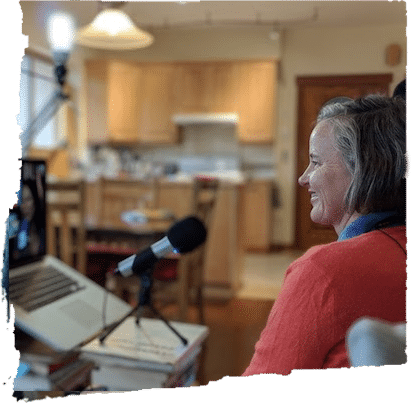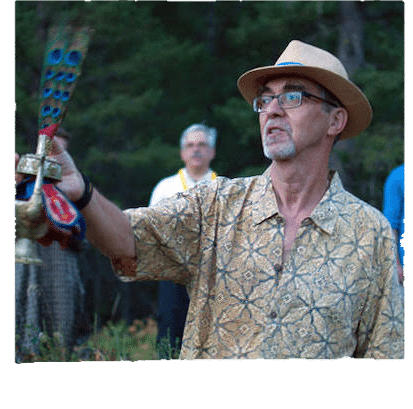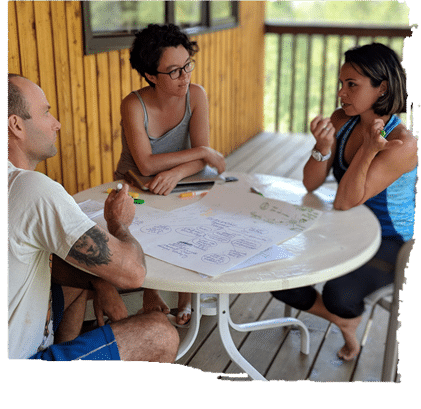New Episodes!
Dharma If You Dare Podcast
What does it take to live a life of meaning and compassion in our busy day-to-day lives? Tune in to get the knowledge and tools you need to help you tackle life’s biggest obstacles joyfully … if you dare!

About Dharma If You Dare
A Planet Dharma Podcast
Dharma Teachers Doug Duncan and Catherine Pawasarat with to share with you the journey to a life of clarity and bliss. Join them on this podcast of excerpts of their live teachings. They share ancient wisdom updated to speak to the current and evolving paradigm of spiritual awakening in our modern age.
Meet the Speakers
Dharma Teachers Qapel (Doug Duncan) and Sensei (Catherine Pawasarat) are spiritual mentors to students internationally and at their retreat center, Clear Sky, in BC, Canada. They are lineage holders in the Namgyal Lineage, both studying under the Venerable Namgyal Rinpoche and other teachers.
Having lived internationally for many years and traveled extensively, Qapel and Sensei draw on intercultural and trans-cultural experience to broaden the range and depth of their understandings of liberation that they share with others.
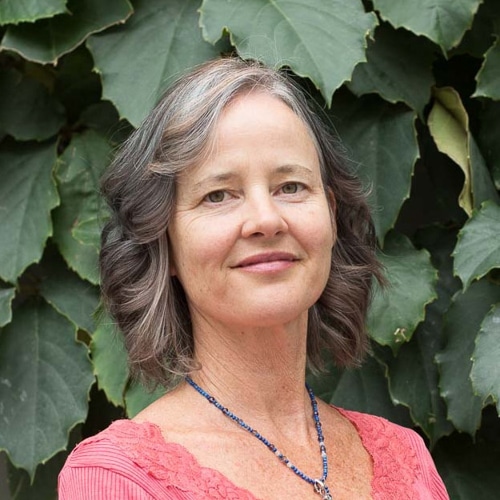
Catherine Sensei
Speaker
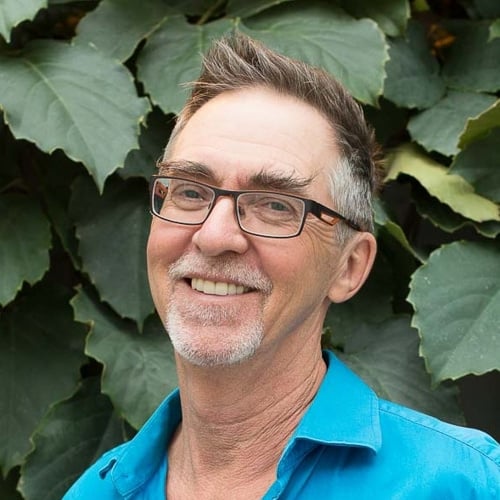
Qapel
Speaker
Dharma if you Dare podcast
Listen Now!
Subscribe to the podcast below on any of your favorite platforms.
The spiritual life and financial well-being [37:19]
Spirituality and economics: being vs having
In this podcast, Doug Duncan and Catherine Pawasarat are interviewed by Deborah Price, founder of the “The Money Coaching Institute” about their new book Wasteland to Pureland. Together they explore topics of spirituality and economics.
A big challenge for many spiritual seekers is maintaining our spiritual practice, while still living a life of economic well-being.
“People often get entrapped into “having” more and more as opposed to “being” more.” Deborah asks, “How do you recommend people move away from that and create a life more in keeping with “being” rather than “having”?
Take a listen to this podcast for the answer to this question and other magic wisdom.
You can find out more about the Wasteland to Pureland book at https://www.planetdharma.com/pureland
Finding your growth edge [12:52]
What`s your most challenging growth edge?
What sparks you? This lively, informal and interactive extract is from a class in our 2017 “Buddhas in Action” retreat at Clear Sky Retreat Center in B.C., Canada, with Achariya Doug Duncan, Catherine Pawasarat Sensei & some of the spiritual community (sangha).
How we use language to name our challenges is highly important and can reveal new insights. For example for someone who tends to take up a lot of space, instead of “I need to learn to fade into the background” a better way to name this would be “I aspire to let other people shine”. I.e. the growth edge is not so much about that person being “less” as supporting other people to show.
In this extract, students offer and share what are some challenging growth edges they have, and what are they most curious about / what most sparks them? Doug and Catherine Sensei offer live interactive teaching on ways to reframe and deepen these question.
Some topics that unfold during this session are “letting go into the chaos,” “running out of time,” my way is better,” “making mistakes,” “staying present in the body,” “engaging,” “looking at layers beneath states,” “learning with others,” “career” and “clinging.”
To register for our mailing list or to attend any upcoming events, please visit us at Planet Dharma. To register for the upcoming “Buddha`s in Action” Retreat for summer 2018, please visit us at https://www.planetdharma.com/event/retreat-buddhas-action/
Tips on becoming a “Buddha in action” [17:31]
Buddhas in Action: Karma Yoga
In this new Planet Dharma episode, Achariya Doug Duncan and Catherine Pawasarat Sensei shine light on the principle that “buddhas in action” (spiritual explorers waking up and growing through the path of selfless service) continually explore the question “What is this?”
During this in-depth talk from the “Buddha’s in Action Retreat 2017,” the teachers discuss the questions “What is yoga?” and specifically, “What is karma yoga?”
“Asking the question “what” drives you to awakening,” mention Achariya Doug Duncan & Catherine Pawasarat Sensei. “When it comes to meditation the self-referencing occurs in relationship to the arisings in the mind, or in the body; in karma yoga it arises in relationship to your task.” Karma yoga helps us to train ourselves to be mindful and aware of the states we are in while doing something and introducing the technology to change that state if it isn`t clear, wholesome, blissful, spacious & awake.
“As easily as you can get lost into the phenomena of your mind, you can get lost into the phenomena of your work.” The practice of karma yoga helps us not get lost, and instead brings awareness of body, speech and mind. This leads us into more compassion in our career and daily lives.
This talk was from the “Buddha’s in Action” Retreat 2017 at Clear Sky Retreat Center in B.C., Canada. To register for our mailing list or to attend any upcoming events, please visit us at Planet Dharma. To register for the upcoming “Buddha`s in Action” Retreat for summer 2018, please visit us at Planet Dharma Buddhas in Action retreat
Healing the Splits Within [4:50]
How do we heal the splits within? In this 5 minute podcast episode, Achariya Doug Duncan and Catherine Pawasarat Sensei elaborate on this question. They share that complete or wholesome effort is when we are in the moment and not distracted by conflicting emotions or primitive thinking. “The more wholesome we are, the more complete our effort is. It is this wholesomeness in conjunction with our experience that heals the splits within.”
This talk was from “Right Effort – Healing the Splits Within”, a webinar series offered by Planet Dharma in 2017, as part of the “Year of Victory” study program. To find out more about Planet Dharma’s teachings and programs please visit us at Planet Dharma.
A vision bigger than your lifetime [10:25]
Study nature and consciousness to inform your vision and career
Catherine Sensei begins this episode explaining, “The natural cycles of nature are in essence the same as the natural cycles of dharma, karma and consciousness.” There’s a natural wisdom and compassion we can access both studying nature and studying consciousness. Doug and Catherine Sensei discuss that society`s number one function is “to free people to explore.” However, because of our busy lives and our clinging to security, very few people take the time to map out and study how their mind works, how their consciousness works. “ Our ego looks for security which leads us into anxiety and missing the wonder. “You need a vision bigger than your lifetime and bigger than yourself. Otherwise the ego will always feel insecure”, Doug and Catherine explain.
This excerpt was taken from the “Right Effort – Career and Creativity” talk, session 1 from the “Year of Victory” classes 2017, at Clear Sky Retreat Center in B.C., Canada. To register for our mailing list visit us at www.planetdharma.com
Our “Body of Truth” creative visualization retreats are an excellent way to spend focused time studying the interplay of nature and consciousness. See https://www.planetdharma.com/events/category/retreats/ to see our upcoming schedule.
Perfect Generosity [4:02]
Perfect generosity and all the paramis follow
In this podcast, Achariya Doug Duncan and Catherine Pawasarat Sensei expand on the six perfections (Paramis) of Generosity, Discipline, Acceptance, Effort, Concentration, Insight and share “If you can perfect generosity, all the rest will follow.” When we do not apply these principles, we move into unnecessary suffering. Achariya Doug states, “If you`re not doing it for yourself, the teacher can talk about it until the cows come home home and it won`t make particularly much difference in your life because its not being applied.” However, when applying these principles in our everyday lives unnecessary suffering cannot arise.
“These Paramis are precious and awesome,” says Catherine Sensei, “to the point where we teach a course on it called “Becoming a Work of Art.”
This excerpt was taken from the “Right Effort – Healing the Splits Within” series given as part of the “Year of Victory” program in 2017, and recorded at Clear Sky Retreat Center in B.C., Canada. To register for our mailing list or to attend any upcoming events, please visit us at www.planetdharma.com
Basic Trust in the Universe
Spiritual awakening requires becoming aware of the ego structure
The first step in spiritual awakening is becoming aware of our ego structure — actually perceiving the particular beliefs and images that we have identified with and taken to be true — then dissolving that, letting go of that part of one’s identity.
Extended paraphrase:
The ego is a psychic structure that is based on crystallized beliefs about who we are and what the world is. We experience ourselves and the world through the filter of this structure. Spiritual awakening involves connecting with those dimensions of experience obscured by ego structure.
The first step is becoming aware — actually perceiving the particular beliefs and images that we have identified with and taken to be true — then dissolving that facet of the ego structure. This means letting go of part of one’s identity, which can be painful or frightening because the old sense of your identity crumbles and you don’t know what will take its place. Letting go of what has felt real feels like jumping into an abyss.
The jumping can be easy or difficult depending on the presence of “basic trust” — the sense that whatever happens will ultimately be fine. The ego’s perspective arises out of a lack of this trust. It is based on distrust, paranoia, and fear that the universe will not take care of you in the ways that you need. Basic trust is the confidence that the universe and human nature are fundamentally good and loving, and that life is fundamentally benevolent. It will help you take that plunge.
You don’t need assurances that things are going to be okay because you implicitly know things are going to be okay. Basic trust gives you the capacity and willingness to let go of the identifications, beliefs, and concepts — remnants of the past — that make up the ego.
If you don’t have basic trust, you will react to what arises in accordance with your conditioning and will want things to go one way or another, rather than to just be, without reacting, which is allowing the ego to die. The more that basic trust is present, the more smoothly the process of realization and transformation can proceed.
If we lack basic trust, it is important to develop it. With basic trust, our lives have a sense of freedom. The desire to know where things are going arises out of simple curiosity rather than a desire to control the unfoldment. Tension and stress from constantly struggling and fighting with our reality become relaxed into a sense of peace that allows a spontaneous and natural unfoldment of one’s being. A new outlook emerges, allowing us to see that whatever happens is right even if it’s painful. Things that we had thought were bad turned out not to be bad.
Doug Sensei teaches on the enneagram, drawing from this source:
Facets of Unity: The Enneagram of Holy Ideas by A.H. Almaas, 1998; Chapter 4, Basic Trust
Search Inside:
https://books.google.com/books/about/Facets_of_Unity.html?id=gdTz5Mt0WtgC&redir_esc=y
Podcast Transcription:
From the point of view of basic trust, the universe will work out. Something will happen. You might end up as a bum under the Trevi fountain or you may end up the king of France- does it really matter from the point of view of transcendence? Not a bit. And since you live your life in such a way that you naturally jump into the abyss without even conceptualizing that you’ll be okay. You have to be very clear, you can’t care. For freedom in your being, for freedom in your being – never mind freedom in the world- for freedom in your being, you can’t actually care if you die tomorrow. Because if you die tomorrow, well, then we’ll see what happens then. Maybe nothing happens then, in which case it won’t be a problem. Or if something happens then it will be, well, it’ll be different.
I guess the selling point for this whole argument is that it’s going to happen anyway. So why freak out about it if it happens tomorrow? My brother, I’m sure, did not know that he was gonna have a stroke yesterday – 65 years old, walking along, retired, thinking, well maybe I’ll run for politics. But then, you know, you get a stroke and then your head, you’re all of a sudden your life is hanging by a thread, right, who knows? And it can happen when you’re 20, you could be in that plane going from Boston to L. A. – or wherever it was headed- and find yourself going into the Twin Towers, you don’t know. So given the fact that you don’t know, anything could happen at any time, don’t you think It’s just better to be really happy about it?
You know, there’s a law of thermodynamics, right? Like energy can neither be created nor destroyed. It only changes its form and fundamentally you are a form, you are energy embodied in a form. And this form is as impermanent and as insubstantial as a dandelion spore in the wind. So what are you worried about? Your life is already a mess. It’ll be equally a mess 20 years from now. It won’t be any more together when you’re 80 than it was when you are when you’re 60. And it’s not any more together when it’s 60 than 20. The only thing that’s changed in all that time is you’re not worried about it anymore. All right, then let’s go one step further. Trust that the ego’s unity with his experience is available to you now, and then you manifest the forms.
So this basic trust is huge, huge, huge. Without it, you’re not gonna be able to let go of your angiogram type unless you trust the universe more than you trust yourself. Unless you trust the universe more than you trust your senses more than you trust your feelings, and more than you trust your thoughts or you’re thinking of your concepts. It’s got to be bigger than that. So the initial step in the process of the transformation of any sector of the ego is this basic trust. The step is only completed by giving up the particular structure that we’ve been holding onto. What is it that you are holding on to? And I don’t mean like your job. I mean, what is it in-depth that you’re hanging on to? Your image? The curious thing about it is if you can surrender that, then you’re quite capable of just being.
It’s not so much that the old dies, as it is that the clinging to it dies. And that allows a realization to occur that you don’t have to fight anymore for anything in your life. You don’t have to struggle. You no longer need to struggle. You have to trust that the universe is okay and that what comes your way will and what doesn’t want. That doesn’t mean from an ego level that you don’t have to go to work, right? Because you’re paying Caesar what’s caesar’s, but you don’t have to struggle about it anymore. So what if you don’t like your job and quit? Well, then what am I gonna do? I don’t know, do something else. Well, then I might have to give up my apartment. Well then don’t quit and continue to struggle, but you can’t have it both ways.
For more information. Please visit clear Sky center dot org. That’s C l e A R S K Y C E N T E R dot org.
The Next Step of Unfoldment
In order for you to move to your next understanding — the next stage of unfoldment — how you position yourself in relationship to your world has to change.
—
Spiritual unfoldment talk transcript:
“The important message that I want to convey tonight is: for you to move to your next understanding, your basic position about how you position yourself in relationship to your world has to go, has to change…in order for you to make the next step of unfoldment. It can’t go to the next level. And if you watch teachers, they do it throughout their lives.
I watched it with my teacher. He reinvented himself, not in terms of just giving classes — that’s what he did, that was his job – but in the way he imaged himself. Every decade it would go through a whole new turn — a whole new person there if you had the eyes to see it. Outwardly it didn’t look all that different. But he went from a stern Theravadin into a yahoo-ey Vajrayana to an interesting epicure, connoisseur-y, renaissance-y kind of guy, to the gentle, relatively gentle, old man. But with each change, the appearance changed. So if you look at the pictures of my teacher through the ages it almost looks like 15 different people, even though my experience of him, and I knew him for 30 years… he in some ways struck my ego as kind of the same. But if you look the pictures of him over time: completely different personic imagings.
So, for you, (fill in your name), to make the next step in your spiritual unfoldment, unless you’ve already done it just recently, [you need a] complete shift and change in the environment. Why not? If someone else did it, it would be okay, right? ‘But not me.’ That’s the point. Not that you have to do that, but why is it that you can’t?”
The talk was originally given on Oct. 19, 2009, in Kyoto, Japan.
Doug Sensei’s teacher was the great Canadian Lama, Namgyal Rinpoche.
The Next Step of Unfoldment
In order for you to move to your next understanding — the next stage of unfoldment — how you position yourself in relationship to your world has to change.
—
Spiritual unfoldment talk transcript:
“The important message that I want to convey tonight is: in order for you to move to your next understanding, your basic position about how you position yourself in relationship to your world has to go, has to change…in order for you to make the next step of unfoldment. It can’t not go to the next level. And if you watch teachers, they do it throughout their lives.
I watched it with my teacher. He reinvented himself, not in terms of just giving classes — that’s what he did, that was his job — but in the way he imaged himself. Every decade it would go through a whole new turn — a whole new person there if you had the eyes to see it. Outwardly it didn’t look all that different. But he went from a stern Theravadin into a yahoo-ey Vajrayana to kind of an interesting epicure, connoisseur-y, renaissance-y kind of guy, to the gentle, relatively gentle, old man. But with each change the appearance changed. So if you look at the pictures of my teacher through the ages it almost looks like 15 different people, even though my experience of him, and I knew him for 30 years… he in some ways struck my ego as kind of the same. But if you look the pictures of him over time: completely different personic imagings.
So, for you, (fill in your name), for you to make the next step in your spiritual unfoldment, unless you’ve already done it just recently, [you need a] complete shift and change in the environment. Why not? If someone else did it, it would be okay, right? ‘But not me.’ That’s the point. Not that you have to do that, but why is it that you can’t?”
Talk originally given on Oct. 19, 2009 in Kyoto, Japan.
Doug Sensei’s teacher was the great Canadian lama, Namgyal Rinpoche.
Follow Us on:
Stay Connected to Get The Latest Podcast Alerts & More
New Episodes Every Friday
More than 80 episodes and growing!
Wake Up: Four Paths to Spiritual Awakening
Embark on the path to waking up – take our free online course:
Want to Hear Us Speak Live?
Support the Work of Planet Dharma
Become a ‘Daring’ Podcast Patron
Dare to Share on these channels:
Micro-patrons get access to bonus resources and exclusive podcast episodes. Learn more by visiting our Patreon page.
You can also support our work by practicing generosity and offering dāna here.

